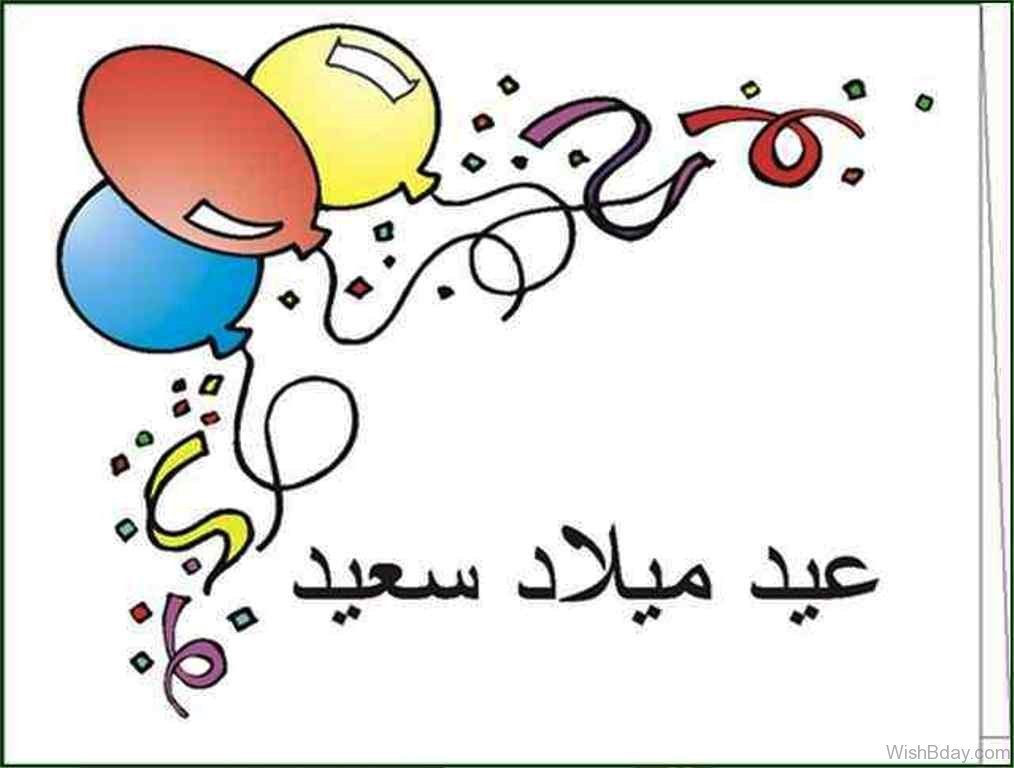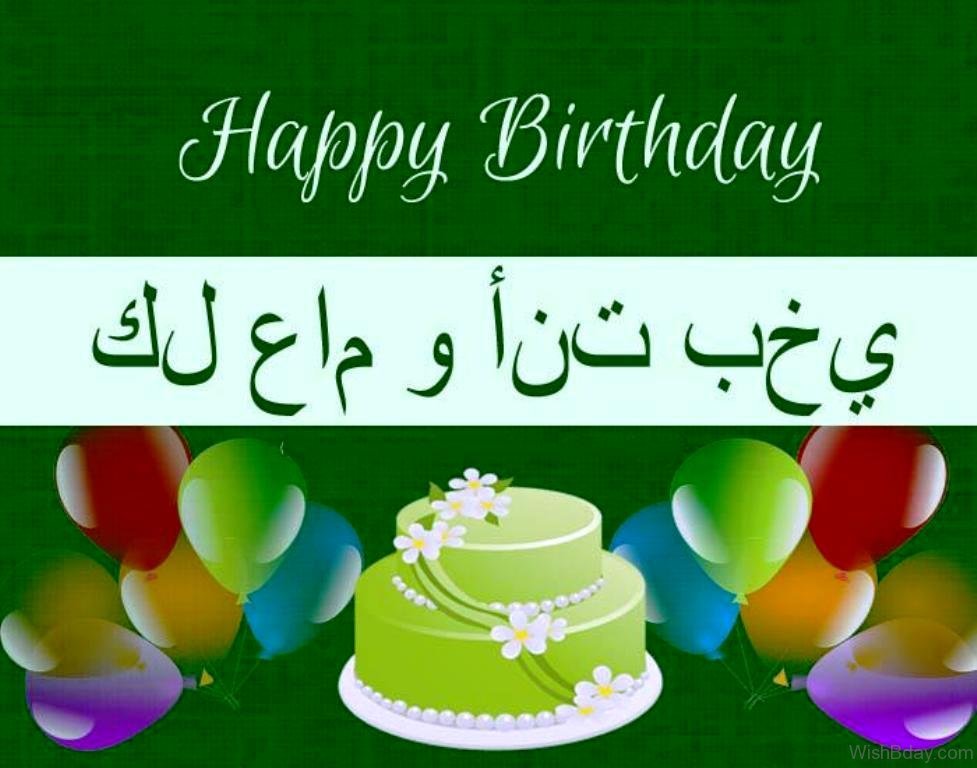As we delve into the realm of “happy birthday in Arabic language,” we embark on a linguistic and cultural journey that unveils the rich traditions and heartfelt expressions surrounding this momentous occasion in Arabic-speaking communities. From the literal translation to the diverse dialects and heartfelt wishes, this comprehensive guide unravels the intricacies of conveying birthday greetings in this vibrant and expressive language.
Throughout history, birthdays have held a significant place in Arabic culture, symbolizing milestones, blessings, and the celebration of life’s precious moments. This introductory paragraph sets the stage for an exploration of the cultural significance of birthdays, traditional customs, and the nuances of expressing “happy birthday” in Arabic.
Arabic Language Overview

The Arabic language is a significant Semitic language spoken by over 370 million people worldwide. It is the official language of 26 countries, including Saudi Arabia, Egypt, Iraq, and Morocco. Arabic is also one of the six official languages of the United Nations.The
history of Arabic can be traced back to the 6th century CE, when it was first used as a written language in the Arabian Peninsula. The language quickly spread throughout the Middle East and North Africa, as it was used to record the teachings of Islam.
Arabic has since become a major literary, scientific, and cultural language.There are many different dialects of Arabic spoken around the world. The most common dialects are Modern Standard Arabic, Egyptian Arabic, Levantine Arabic, and Iraqi Arabic. Modern Standard Arabic is the official language of all Arabic-speaking countries and is used in education, government, and the media.
The other dialects are used in everyday conversation and vary from region to region.Here are some common Arabic greetings and phrases:* As-salamu alaykum (Peace be upon you)
- Wa alaykum as-salam (And peace be upon you)
- Shukran (Thank you)
- Ma’a as-salama (Goodbye)
- Bi kam? (How much?)
- Shurta (Police)
- Mustashfa (Hospital)
Cultural Significance of Birthdays: Happy Birthday In Arabic Language
In Arabic-speaking cultures, birthdays hold significant cultural importance, symbolizing a celebration of life and the passage of time. These special occasions are marked with traditional customs, heartfelt well-wishes, and joyous festivities.
Traditional birthday celebrations in Arabic-speaking countries often involve family gatherings, where loved ones come together to share meals, exchange gifts, and create lasting memories. Children’s birthdays are particularly celebrated with enthusiasm, often accompanied by entertainment such as games, music, and storytelling.
Birthday Songs and Well-Wishes
Birthday songs in Arabic are an integral part of the celebrations. A popular song is “Mabrouk Alayk Ya Habibi,” which translates to “Congratulations, My Beloved.” The lyrics express heartfelt wishes for happiness, prosperity, and a long life.
Well-wishes are also a significant aspect of Arabic birthday traditions. Common phrases include “Kul Aam Wa Inta Bi Khair,” meaning “May every year find you well,” and “Yusta’mar Sa’dak,” which translates to “May your happiness be everlasting.”
Happy Birthday in Arabic
In Arabic, the phrase “Happy Birthday” can be expressed in several ways, depending on the dialect and context. The most common translation is “عيد ميلاد سعيد” (Eid Milad Saeed), which literally means “Happy Birthday Celebration.” Other variations include “كل عام وأنت بخير” (Kull `Aam Wa Anta Bi Khair), meaning “May every year find you well,” and “مبروك عيد ميلادك” (Mabrook Eid Miladak), meaning “Congratulations on your birthday.”
Pronunciation and Grammar
The pronunciation of “Eid Milad Saeed” is as follows:
- Eid: Pronounced as “eed,” with a short “e” sound.
- Milad: Pronounced as “mee-lahd,” with the emphasis on the second syllable.
- Saeed: Pronounced as “sa-eed,” with a long “a” sound.
The phrase follows the standard Arabic grammar of noun-adjective agreement. “Eid” (birthday) is a masculine noun, so the adjective “Saeed” (happy) must also be in the masculine form.
Variations in Different Dialects
The following table shows different variations of “Happy Birthday” in various Arabic dialects:
| Dialect | Translation |
|---|---|
| Standard Arabic | عيد ميلاد سعيد (Eid Milad Saeed) |
| Egyptian Arabic | كل سنة وأنت طيب (Kull Sana Wa Anta Tayyib) |
| Levantine Arabic | عيد ميلادك سعيد (Eid Miladak Saeed) |
| Moroccan Arabic | عيد ميلادك مبارك (Eid Miladak Mubarak) |
| Iraqi Arabic | كل عام وأنت بخير (Kull `Aam Wa Anta Bi Khair) |
Birthday Wishes and Expressions
Birthday wishes and expressions in Arabic vary depending on the formality of the situation and the relationship between the speaker and the birthday person.
Formal Expressions
Formal birthday wishes are typically used in professional or business settings, or when addressing someone with whom you have a formal relationship. Some common formal birthday wishes in Arabic include:
- “كل عام وأنت بخير” (kull ‘ām wa-anta bi-khayr): May every year find you well.
- “أتمنى لك عيد ميلاد سعيدًا” (atamanna laka ‘īd mīlād sa’īdan): I wish you a happy birthday.
- “مبارك عليك عيد ميلادك” (mubārak ‘alayka ‘īd mīlādak): Happy birthday to you.
Informal Expressions, Happy birthday in arabic language
Informal birthday wishes are used in more casual settings, such as with friends and family. Some common informal birthday wishes in Arabic include:
- “عيد ميلاد سعيد” (‘īd mīlād sa’īd): Happy birthday.
- “كل سنة وأنت طيب” (kull sanah wa-anta tayyib): May every year find you well.
- “بالصحة والعافية” (bi-al-ṣiḥḥah wa-al-‘āfiyah): May you be in good health and well-being.
Poetic Expressions
Poetic birthday wishes are often used in cards or letters to express heartfelt sentiments. Some common poetic birthday wishes in Arabic include:
- “يا زهرة عمري” (yā zahrat ‘umrī): O flower of my life.
- “يا شمعة عمري” (yā shama’at ‘umrī): O candle of my life.
- “يا نجمة عمري” (yā najmāt ‘umrī): O star of my life.
When using these expressions, it is important to consider the context and the relationship between the speaker and the birthday person. Formal expressions are typically used in professional or business settings, while informal expressions are used in more casual settings.
Poetic expressions can be used to express heartfelt sentiments in cards or letters.
Birthday Celebrations in Arabic-Speaking Countries
Birthday celebrations in Arabic-speaking countries are typically joyous occasions marked by family gatherings, gift-giving, and traditional festivities. The festivities vary across different regions, but some common elements include:
Family Gatherings
Family plays a central role in birthday celebrations in Arabic-speaking countries. Extended family members, including grandparents, aunts, uncles, and cousins, often gather to celebrate the special day. The birthday person is the center of attention, receiving love, blessings, and well wishes from their loved ones.
Gift-Giving
Gifts are an essential part of birthday celebrations in Arabic-speaking countries. Traditional gifts include clothing, jewelry, perfumes, and religious items. Children may receive toys, books, or educational games. The value of the gift is less important than the sentiment behind it, as it symbolizes love and affection.
Traditional Festivities
Birthday celebrations in Arabic-speaking countries often include traditional festivities, such as:
Zaffeh
A traditional procession led by musicians and dancers, which accompanies the birthday person to the celebration venue.
Dabke
A lively folk dance performed by both men and women, often seen at birthday parties.
Mahashi
Stuffed vegetables, such as grape leaves, zucchini, or bell peppers, served as a traditional dish at birthday feasts.
Kunafa
A sweet pastry made with shredded filo dough, filled with cheese or nuts, and topped with syrup, often served as a birthday dessert.
Cross-Cultural Birthday Greetings

When sending birthday greetings to someone from an Arabic-speaking culture, it is important to be aware of the local etiquette and customs. In many Arabic-speaking countries, it is considered polite to send a greeting on the day of the person’s birthday, as well as on the day before and the day after.
It is also customary to send a small gift, such as flowers or chocolates.
When adapting birthday messages for different cultural contexts, it is important to consider the following:
- The age of the person you are sending the message to.
- The relationship you have with the person you are sending the message to.
- The cultural context of the person you are sending the message to.
For example, a birthday message to a young child would be more playful and lighthearted than a birthday message to an adult. A birthday message to a close friend or family member would be more personal and affectionate than a birthday message to a colleague or acquaintance.
Here are some examples of appropriate birthday greetings for both Arabic and non-Arabic speakers:
- Arabic:كل عام وأنت بخير (kull ām wa-anta bi-khayr) – “May you have many happy years.”
- Non-Arabic:Happy birthday! I hope you have a wonderful day.
- Arabic:عيد ميلاد سعيد (ʿīd mīlād saʿīd) – “Happy birthday.”
- Non-Arabic:I hope you have a fantastic birthday!
Conclusive Thoughts

In conclusion, navigating the cultural landscape of birthday greetings in Arabic-speaking countries requires sensitivity, respect, and an appreciation for the diverse expressions that convey joy and well wishes. By embracing the rich traditions and linguistic variations, we can extend heartfelt birthday messages that resonate with the cultural heritage and spirit of these communities.
May this guide serve as a valuable resource for fostering meaningful connections and celebrating the special moments of life in the Arabic language.
FAQ Section
What is the literal translation of “Happy Birthday” in Arabic?
The literal translation of “Happy Birthday” in Arabic is “Eid Milad Saeed” (عيد ميلاد سعيد).
How do you say “Happy Birthday” in different Arabic dialects?
The pronunciation and variations of “Happy Birthday” differ across Arabic dialects. For example, in Egyptian Arabic, it is pronounced as “Eid Milad Saeed” (عيد ميلاد سعيد), while in Levantine Arabic, it is pronounced as “Mabrook Eid Miladak” (مبروك عيد ميلادك).
What are some common birthday wishes in Arabic?
Common birthday wishes in Arabic include “Kul Aam wa Enta بخير” (May every year find you well), “Mabrook Eid Miladak” (Happy Birthday), and “Yirba bik” (May you live to see many more).